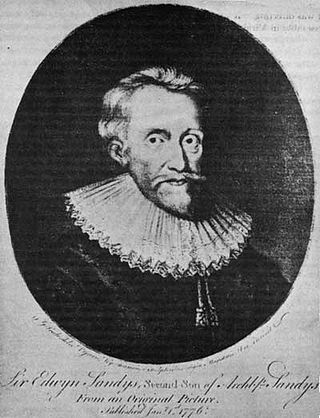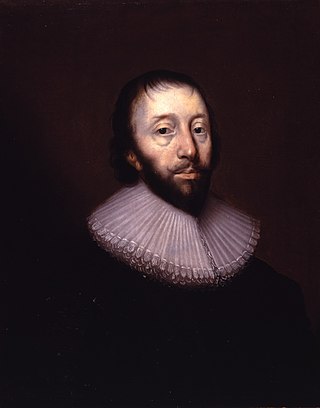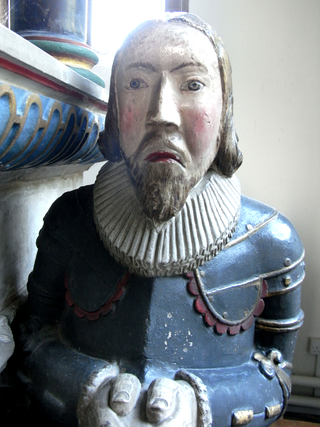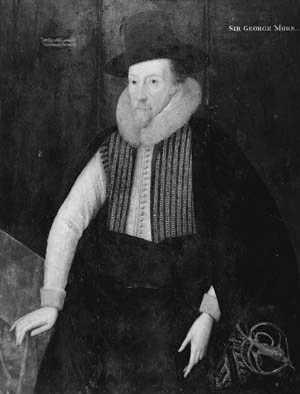Related Research Articles

Sir Edwin Sandys was an English politician who sat in the House of Commons at various times between 1589 and 1626. He was also one of the founders of the proprietary Virginia Company of London, which in 1606 established the first permanent English settlement in what is now the United States in the colony of Virginia, based at Jamestown. The parish of Sandys, in Bermuda is named after him.

Richard Weston, 1st Earl of Portland, KG, was Chancellor of the Exchequer and later Lord Treasurer of England under James I and Charles I, being one of the most influential figures in the early years of Charles I's Personal Rule and the architect of many of the policies that enabled him to rule without raising taxes through Parliament.

Sir Dudley Digges was an English diplomat and politician who sat in the House of Commons between 1610 and 1629. Digges was also a "Virginia adventurer," an investor who ventured his capital in the Virginia Company of London; his son Edward Digges would go on to be Governor of Virginia. Dudley Digges was responsible for the rebuilding of Chilham Castle, completed in around 1616.

Sir John Fortescue of Salden Manor, near Mursley, Buckinghamshire, was the seventh Chancellor of the Exchequer of England, serving from 1589 until 1603.
Sir William Armine, 1st Baronet was an English politician who sat in the House of Commons at various times between 1621 and 1651. He supported the Parliamentary cause in the English Civil War.
Sir Thomas Bowyer, 1st Baronet was an English politician who sat in the House of Commons at various times between 1614 and 1642. He supported the Royalist cause in the English Civil War.

Sir John Glanville the younger, was an English politician who sat in the House of Commons at various times between 1614 and 1644. He was Speaker of the English House of Commons during the Short Parliament. He supported the Royalist cause in the English Civil War.

Sir Francis Popham (1573–1644) of Wellington, Somerset, was an English soldier and landowner who was elected a Member of Parliament nine times, namely for Somerset (1597), Wiltshire (1604), Marlborough (1614), Great Bedwin (1621), Chippenham 1624, 1625, 1626, 1628–29), and for Minehead (1640–1644).
Sir Alexander St John was an English politician who sat in the House of Commons variously between 1621 and 1629.
Sir Henry Compton KB was an English politician who sat in the House of Commons at various times between 1601 and 1640.
Sir Robert Pye (1585–1662) was an English courtier, administrator and politician who sat in the House of Commons between 1621 and 1629. He supported the Royalist cause in the English Civil War.

Sir George More was an English courtier and politician who sat in the House of Commons at various times between 1584 and 1625.

Richard Berkeley (1579–1661) of Stoke Gifford and Rendcomb both in Gloucestershire, England, served as a Member of Parliament for Gloucestershire in 1614.
Sir Maurice Berkeley (1599–1654) was an English politician who sat in the House of Commons at various times between 1621 and 1626. He supported the Royalist cause in the English Civil War. Berkeley was the son of Richard Berkeley of Stoke Gifford and Rendcomb, Gloucestershire who was Member of Parliament for Gloucestershire in 1614.
Anthony Robinson (c1582-1641) was an English politician who sat in the House of Commons in 1621 and 1624.
John Delbridge was an English merchant from Devon who was elected six times as a Member of Parliament.
Edward Whitby was an English lawyer and politician who sat in the House of Commons between 1614 and 1629.
Ignatius Jordain was an English merchant and politician who sat in the House of Commons between 1621 and 1629.
The Mayor of Gloucester is the first citizen of the City of Gloucester, England, and acts as chair of the council. The Mayor represents the Council and the City at civic, ceremonial and community events both inside the City boundaries and elsewhere.
References
- ↑ VCH Gloucestershire vol. 4: The City of Gloucester. 1988. p. 377.
- ↑ Notes on the Diocese of Gloucester by Chancellor Richard Parsons. Bristol and Gloucestershire Archaeological Society. 2005. p. 413.
- 1 2 3 "BROWNE, John I (c.1575-1638), of Gloucester and Churcham, Glos". History of Parliament. Retrieved 2 August 2014.
- ↑ VCH Gloucestershire 4. p. 88.
- ↑ VCH Gloucestershire vol. 10: Westbury and Whitstone Hundreds. 1972. p. 17.
- ↑ Bigland's Historical, Monumental and Genealogical Collections Pt. 1. Bristol and Gloucestershire Archaeological Society. 1989. p. 351.
- ↑ Notes on the Diocese of Gloucester by Chancellor Richard Parsons. p. 216.
- ↑ Mayo, Charles Herbert (1908). A genealogical account of the Mayo & Elton families of Wilts and Herefordshire and some other adjoining counties. p. 126.
- ↑ Gloucestershire Inquisitiones Post Mortem Charles I Part 2 (1637-42). 1893. pp. 79–80.